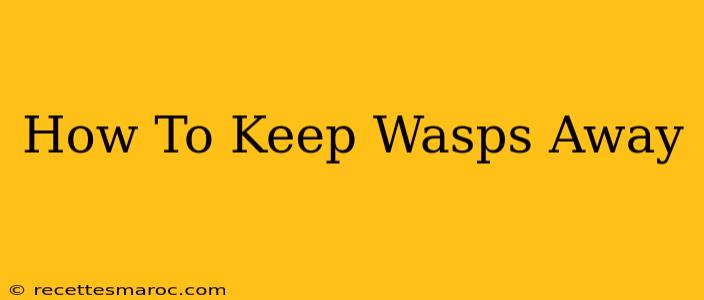Wasps. Those buzzing, stinging insects that can quickly turn a summer picnic into a frantic retreat. Nobody wants them around, especially when kids are playing or you're trying to enjoy the outdoors. But instead of resorting to frantic swatting (which rarely works and can make things worse!), let's explore effective and humane ways to keep wasps away from your property.
Understanding Wasp Behavior: The First Step to Prevention
Before we dive into solutions, understanding wasp behavior is key. Wasps are attracted to a few key things:
- Sweet scents: Overripe fruit, sugary drinks, and even the scent of certain flowers can lure them in.
- Food sources: Wasps are predators and scavengers, attracted to meat, decaying organic matter, and even pet food left outdoors.
- Nesting sites: Wasps actively seek out sheltered places to build nests, often in wall cavities, under eaves, or in sheds.
By understanding these attractions, you can begin to eliminate potential wasp magnets around your home and garden.
Effective Strategies to Deter Wasps
Here's a breakdown of effective methods, ranging from simple preventative measures to more active deterrents:
Preventative Measures: Keeping Wasps Away Before They Arrive
- Cleanliness is Key: Regularly clean up spilled food and drinks immediately. Keep garbage cans tightly sealed and empty them frequently. This eliminates the attractants that draw wasps in the first place.
- Secure Food and Drinks: When eating outdoors, keep food covered and drinks sealed. Avoid leaving food scraps lying around.
- Proper Waste Disposal: Dispose of compost properly and promptly. This prevents attracting wasps and other pests seeking decaying matter.
- Repair Gaps and Holes: Inspect your home's exterior for cracks, gaps, or holes where wasps might build nests. Seal these openings with caulk or other suitable materials.
Active Deterrents: Chasing Wasps Away
- Natural Repellents: Certain scents are known to deter wasps. Plant herbs like mint, lemongrass, and basil around your property. You can also try using essential oils like citronella or eucalyptus in diffusers or spray bottles (always dilute properly!). Note: These may not be 100% effective but can contribute to a less appealing environment for wasps.
- Commercial Wasp Repellents: Many commercially available wasp sprays and repellents are effective, particularly in dealing with existing nests. Always follow the instructions carefully and prioritize safety.
- Traps: Wasp traps can be helpful, but they're best used strategically and in conjunction with other preventative measures. They are most effective for catching smaller numbers of wasps and are not a guaranteed solution for a large infestation. Choose traps that are humane and minimize harm to beneficial insects.
- Distraction Techniques: If you spot a wasp investigating your food or drink, try gently distracting it with a small spray of water.
When to Call a Professional
While the methods above are highly effective in preventing and deterring wasps, sometimes a professional pest control service is necessary. This is especially true if:
- You have a large wasp nest.
- You're dealing with an aggressive wasp species.
- You're uncomfortable dealing with wasps yourself.
- You have allergies to wasp stings.
Safety First: Remember that it's crucial to prioritize safety when dealing with wasps. Never try to remove a nest yourself unless you're experienced and equipped with proper protective gear.
By following these tips and understanding wasp behavior, you can create a wasp-free environment and enjoy your outdoor spaces without the constant threat of stings. Remember to always choose humane and safe methods to keep both yourself and the environment protected.

